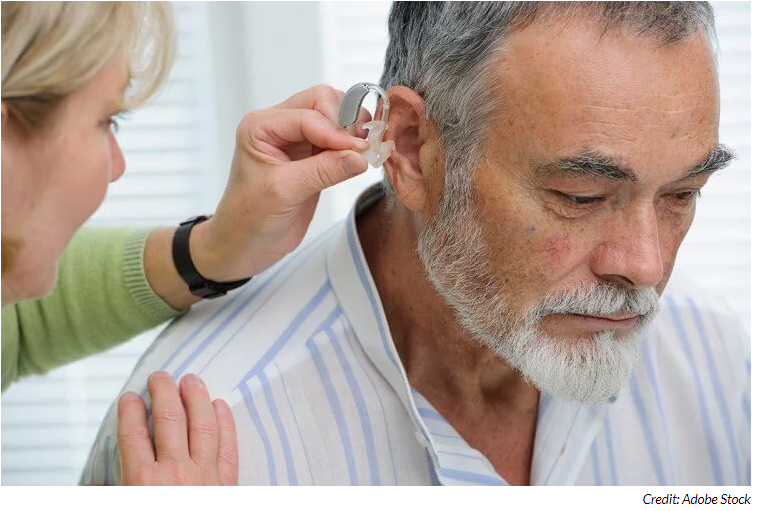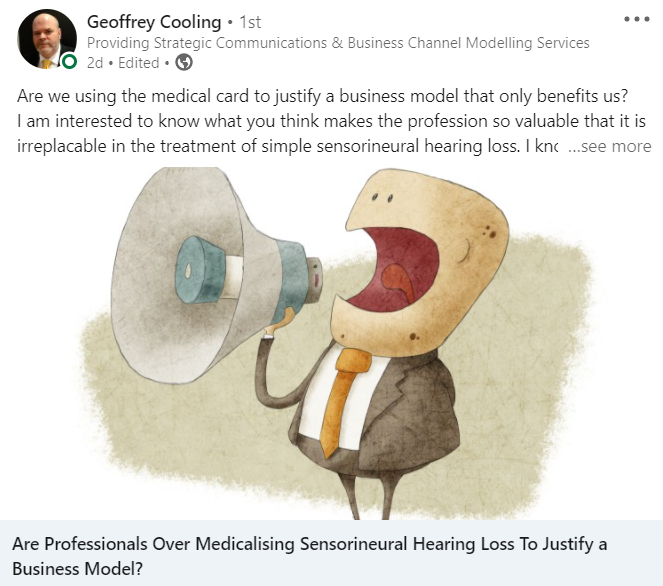
Hearing Aid Intervention Helps Individuals Gradually Adjust To Devices
November 10, 2019
H.R 3: Evidence of a Burgeoning New Reality?
January 7, 2020A few years ago, researchers at the Johns Hopkins University School of Medicine gave us yet another reason to worry about getting Alzheimer’s disease and other dementias: They demonstrated an association between hearing loss and cognitive decline.
Specifically, people with moderate hearing loss were twice as likely to experience cognitive decline as their peers, while those with severe hearing loss faced five times the risk.
But that’s not the only problem people with hearing loss face. Researchers at the University of Colorado at Boulder have confirmed that the brain’s ability to process sound — that is, make sense of it — declines as a person’s ability to hear decreases.
“What was surprising is that, while this has been shown in deafness, some of our recent work shows this in early-stage hearing loss,” says researcher Anu Sharma, a professor in the University of Colorado’s Department of Speech, Language and Hearing Sciences.
Brain Compensates With ‘Cross-Modal Recruitment’
In the study, Sharma and her colleagues recruited adults between the ages of 37 and 68 to have their hearing tested and their brains examined. None were currently being treated for hearing loss, although some suspected that their hearing was not what it had once been.
The subjects underwent hearing tests, and also tests using visual stimuli (basically, circle and star figures presented 150 times over three minutes). Electroencephalograms (EEGs) showed that seeing those images fired up the brain’s visual cortex, as you might expect, but also fired up the auditory cortex in subjects with hearing loss.
In essence, parts of the brain that previously processed auditory signals were now processing visual signals, thanks to a phenomenon called “cross-modal recruitment.”
The upshot of these brain changes is that people can have a harder time processing sound once they do get hearing aids.
“Because you rely more on this other sense, what happens is the auditory cortex then gets repurposed for visual processing,” Sharma says.
Cross-modal recruitment happens because of neuroplasticity, which is the brain’s ability to reorganize itself based on sensory inputs, learning, damage or other factors. Neuroplasticity is most notable in children’s rapidly developing brains, but continues throughout adulthood.
“Over the last few decades, we’ve known that neuroplasticity decreases as you grow older, but it doesn’t go away,” Sharma says. In terms of sound, if the brain doesn’t need to allocate as much capacity to auditory signals, it reallocates some of that capacity to the other senses.
That finding doesn’t surprise Cindy Bearce, an audiologist who runs the Costco Hearing Aid Center in San Marcos, Calif. “When there is auditory deprivation, the auditory cortex stops firing all its synapses acutely,” she says. “It will actually send information to other parts of the brain that are being stimulated more, so then when we turn around and try and stimulate that part of the brain [with hearing aids], it kind of doesn’t know what to do.”
Negative Affect on Higher-Level Thinking
But cross-modal recruitment can also affect other parts of the brain, including the prefrontal cortex, which is responsible for tasks like higher-level thinking and executive function. And that can be a problem, according to Sharma.
“If [the prefrontal cortex] has been recruited just to listen, the issue becomes: Is it going to be available for encoding what you’ve heard into long-term memory, for comprehending and responding, for all the things we have to do after we listen?” she says.
The upshot of these brain changes is that people can have a harder time processing sound once they do get hearing aids. “They tend to have a little more of that inability to discriminate what those sounds are,” Bearce says. “They can still hear the tones if we make them loud enough, but the speech and the understanding, it’s just not clear.”
For example, if you were to tell someone to “put this in the back,” the person might say, “What bag?” And by the time he or she has figured out what you meant, you’re already two sentences ahead.
Neuroplasticity Goes Both Ways
Fortunately, what neuroplasticity takes away, it can also give back — at least according to research Sharma and one of her graduate students recently completed.
In this study, the researchers gave a group of adults with mild to moderate hearing loss a battery of tests on cognition, executive function, visual and auditory working memory and depression. The subjects were then provided with top-of-the-line, professionally-fitted hearing aids, which they committed to wear faithfully for six months. After that, the researchers repeated the tests they’d conducted at the outset, with promising results.
“We found that the cross-modal plasticity reversed, which was exciting,” Sharma says. “But even more exciting was that they improved in most of their cognitive scores. The only one they didn’t improve on was auditory working memory, but they improved significantly on … executive function, processing speed, visual working memory, all of that.” (A paper describing the new research is expected to be published by the end of the year.)
Sharma offers a cautionary note, however. “I want to emphasize that these were very well-fitted hearing aids by an audiologist in our clinic,” she says. “Well-fitted hearing aids early on can help reverse some of these changes.”
People Wait Too Long to Get Hearing Aids
Unfortunately, many adults with hearing loss delay getting help. In fact, one study found that adults wait more than 10 years on average after being diagnosed with hearing loss to get hearing aids.
One reason for the delay is perceived stigma. Another is that hearing loss develops so gradually, its severity sneaks up on people.
“If you went from normal hearing to having a hearing loss overnight, you would run to the doctor,” Bearce says. With gradual hearing loss, however, people just get used to their new normal until that new normal becomes unbearable.
Research like Sharma’s demonstrates that those procrastinators may someday find their hearing aids — and their brains — don’t work as well as they should if they delay getting the help they need.
This information is from an article written by freelance writer Mark Ray and published on NextAvenue.org on October 21, 2019



